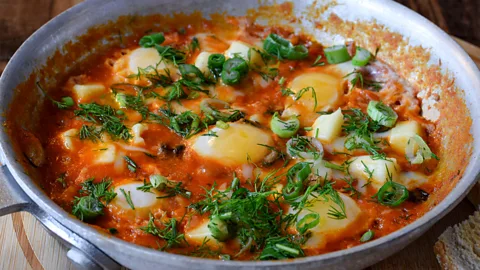Can you share a favourite story from the book?
There isn’t just one powerful story – everyone I spoke to shared something meaningful and full of impact. I hope the overall breadth of the book is what readers find powerful. It’s the collective weight of these voices that tells the real story. The communities in this book show us what it looks like to carry home with you, even when you’ve been uprooted. That spirit is what’s most important and inspiring.
How did the people you interviewed respond when you asked them to share their stories and recipes?
Tenderly. There was laughter, some tears and always, always a deep sense of pride.
Why do you think food holds identity so powerfully, especially in times of displacement?
I got into food shortly after reuniting with my family, after 15 years of being apart. I started to question all that I had erased or tried to erase. I think in order for me to have got to the point where I am now, it was really important for me to understand where I came from. So I think sometimes food can provide a calling back of sorts to where we’re from, or even sometimes give direction for where we’re going.
My hope is that readers will cook these dishes, share them, and in doing so, make room at the table for all of us – Hawa Hassan
The thing that I’ve come to understand is that [food is] sensory. A smell can place you in a whole different time in your life. A taste can place you at a whole different place. And I think that it’s common: no matter who you are or where you are, you have to eat.
When I was thinking about this book, [someone] said to me: “I don’t think people care about food when there’s bombs going off over their heads.” And I was like… “Actually, food is the thing that grounds them.”
 Alamy
AlamyWhy was it important for you to tell stories of immigration and displacement, especially right now?
Somebody needs to keep a record. Not just one person, but many people need to tell their stories as loud as possible so that the people in charge do not silence us into fear or into being othered.
More than ever, we need stories, we need storytellers, we need people who keep cultures intact. We need chefs; we need home cooks. I don’t care if your way of being proactive in these times is just cooking a meal for a bunch of people who are trying to figure out the solution. I think more than ever, it’s important to be at the table. And even if you don’t know what the story is, listen to the other people who have a story to share.
What do you hope readers will take away from Setting a Place for Us?
I hope they come away with a deeper respect for the quiet, everyday ways people preserve culture. That they see how food is never just food – it’s memory, identity and survival. This book isn’t just a collection of recipes; it’s a chorus of voices that have too often been left out of the story. My hope is that readers will cook these dishes, share them, and in doing so, make room at the table for all of us.